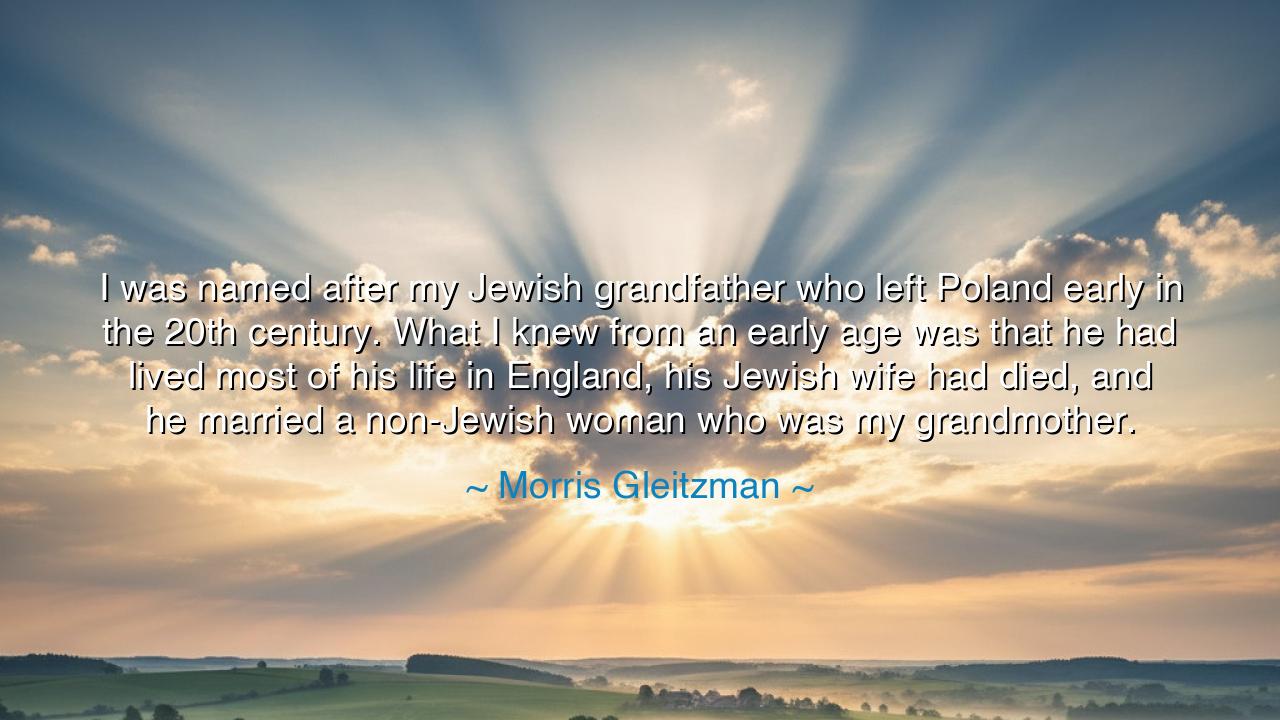
I was named after my Jewish grandfather who left Poland early in
I was named after my Jewish grandfather who left Poland early in the 20th century. What I knew from an early age was that he had lived most of his life in England, his Jewish wife had died, and he married a non-Jewish woman who was my grandmother.






In the tapestry of family and heritage, there are threads that stretch across generations, binding the past to the present in ways that shape who we are and who we will become. Morris Gleitzman, in reflecting on the name he bears, speaks of a legacy that spans continents, cultures, and time. “I was named after my Jewish grandfather who left Poland early in the 20th century. What I knew from an early age was that he had lived most of his life in England, his Jewish wife had died, and he married a non-Jewish woman who was my grandmother.” In these words, Gleitzman offers a glimpse into the rich history of a family that, like so many others, carries the weight of both tradition and change, bridging worlds that might otherwise have remained apart.
In the ancient world, the concept of legacy was of paramount importance. The Greeks, for instance, placed great value on their ancestors and the stories that defined them. Herodotus, the father of history, spent his life recording the stories of great families, wars, and empires, all with the aim of preserving the past for future generations. Similarly, Gleitzman’s reflection on his grandfather carries a deep connection to the past, to the choices made, and the lives that were shaped by them. The legacy of his grandfather's journey—from Poland to England, from Judaism to marrying a non-Jewish woman—speaks to the complexity of identity and the ways in which family and history intermingle to form the tapestry of one's life.
Consider the story of Odysseus, whose journey was not just one of physical distance but of the transformation of identity. As he traveled through strange lands and encountered gods and monsters, he was constantly shaped by his encounters. His journey was not just an external one but a deep internal one, testing his wisdom, courage, and understanding. Much like Gleitzman’s grandfather, whose journey spanned countries, religions, and relationships, Odysseus’ path is a metaphor for the intermingling of different worlds and the profound impact it has on one’s identity. His journey—both literal and symbolic—reminds us that the paths we walk are often shaped by forces beyond our control, yet they mold us into who we are destined to become.
In the case of Morris Gleitzman’s grandfather, there is a powerful lesson of adaptation and growth. Leaving Poland at the dawn of the 20th century, he not only fled the turmoil of his homeland but sought a new life in England. There, he forged a new family, marrying a non-Jewish woman, thus crossing the boundary between his Jewish roots and a broader world. This act of intermarriage, though controversial in his time, speaks to the possibility of bridging divides—both cultural and religious. It is a story that resonates deeply with the struggles and hopes of countless immigrants and exiles throughout history, who have sought not just to survive, but to thrive in foreign lands, and to forge new lives in the face of adversity.
This theme of bridging divides echoes through the story of Mahatma Gandhi, who, though born into a Hindu family, embraced ideas that transcended religious boundaries. His philosophy of nonviolence and unity sought to unite people of all faiths in the struggle for independence. Much like Gleitzman’s grandfather, Gandhi sought to create a new life amidst the complexities of identity and culture, showing that true strength lies in the ability to move beyond division and embrace a more universal humanity. Gleitzman’s reflection on his grandfather’s journey offers a similar lesson: that the intermingling of different cultures and faiths is not a weakness but a strength, a chance to build something new and more inclusive.
As we look at Gleitzman’s words, we are reminded that the family stories we inherit are not just tales of the past; they are the keys to understanding who we are and how we relate to the world. The grandfather's migration from Poland to England, his marriage to a non-Jewish woman, and the name that Gleitzman carries forward are all part of the greater tapestry of human experience—a story of migration, adaptation, and the struggles that define us as individuals and as nations. These stories are the threads that bind the past to the present and offer wisdom for future generations.
The lesson here is one of embracing complexity and unity. Just as Gleitzman’s grandfather bridged the worlds of Poland and England, of Judaism and a broader worldview, we too must learn to navigate the complexities of our own identities. Whether through the lens of family, culture, or faith, we must understand that we are all shaped by multiple forces, and in embracing those forces, we create a richer, more meaningful life. Let us honor the legacy of those who came before us, recognizing the challenges they faced and the wisdom they imparted, while also forging a future that is inclusive, compassionate, and unified.






AAdministratorAdministrator
Welcome, honored guests. Please leave a comment, we will respond soon